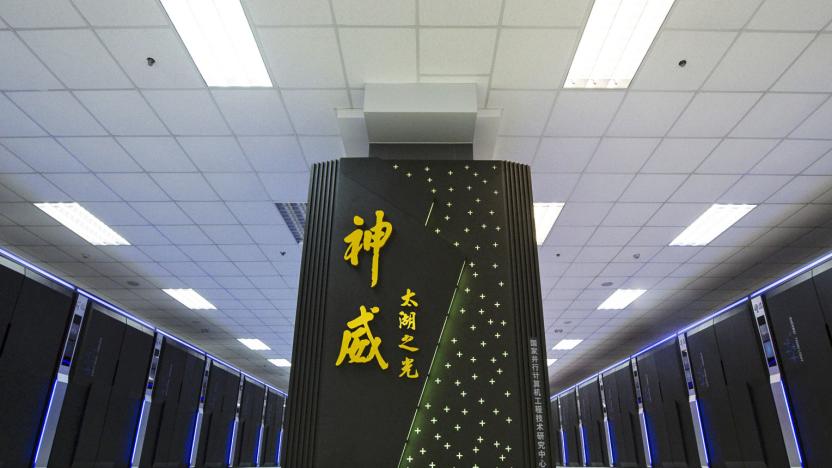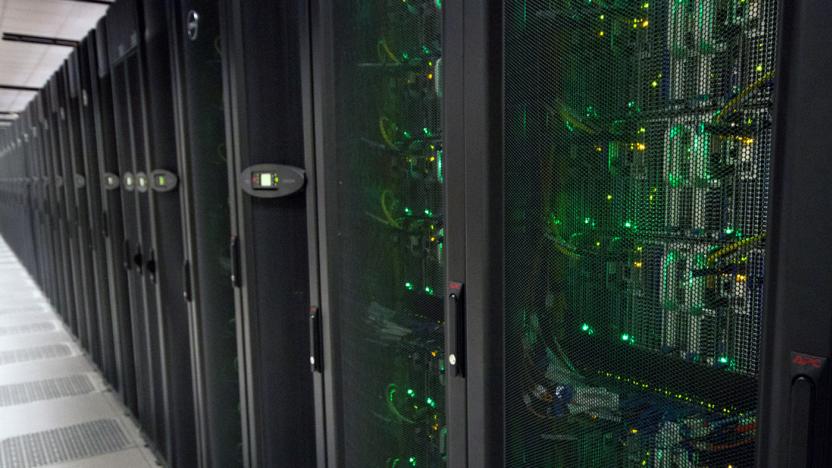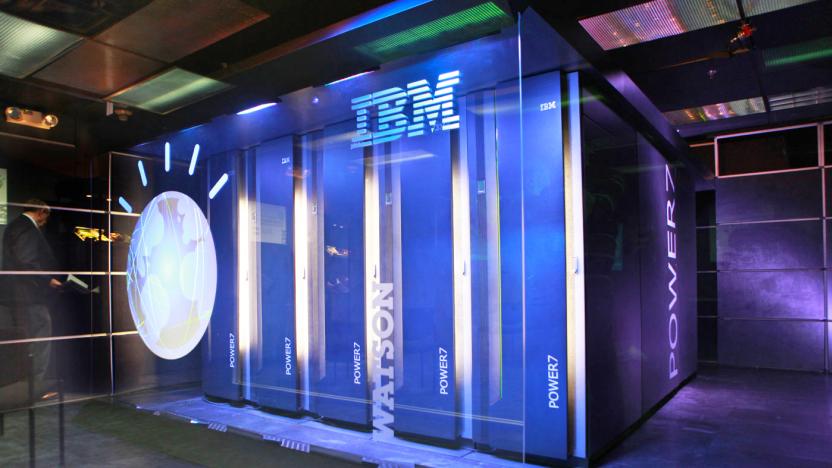supercomputer
Latest

Japan wants the world's fastest supercomputer by 2018
Our world is in transition, with automation and digitization edging-out more humane forms of industrial labor. Some countries are actively pushing against that, but others, like Japan, are running head-first towards the future. The nation is believed to be pushing to build the world's fastest supercomputer in an attempt to revitalize its recent malaise. Reuters is reporting that officials will spend $173 million on a machine capable of achieving 130 petaflops and besting current world number one, China's Sunway TaihuLight.

Elon Musk's OpenAI will teach machines to talk using Reddit
NVIDIA CEO Jen-Hsun Huang has delivered the first DGX-1 supercomputer to Elon Musk's OpenAI nonprofit, and the researchers already have a project in mind. Believe it or not, they want to teach AI to chat by reading through Reddit forums, according to MIT Technology Review. That seems dicey given the site's countless, bizarre forums, but the sheer size of it is what attracted the team. "Deep learning is a very special class of models because as you scale [them] up, they always work better," says OpenAI researcher Andrej Karpathy.

China made the world's fastest supercomputer using its own chips
There's a new computing champion... and unlike past years, this one doesn't depend on any Western tech to crunch numbers. Top500 has declared that China's Sunway TaihuLight, a 40,960-node system powered entirely by Chinese processors (the 260-core ShenWei 26010), is the world's fastest supercomputer. And it's leading by a wide margin, too. At 93 petaflops of processing power, it's nearly three times more powerful than the previous record-setter, the 33.85-petaflop Tianhe-2.

India is building a monsoon-predicting supercomputer
In India, monsoons are big business. If the country has a healthy rainy season, its agricultural industry thrives and helps account for a fifth of the total value of its goods and services. It's vitally important for meteorologists to predict when those rains will come, so instead of utilizing numerical or statistical predictions -- which once failed to predict India's biggest drought in 40 years in 2009 -- the country is spending $60 million on a supercomputer that could give farmers the advance notice they need to plant crops and increase yields.

Largest-ever math proof chews up 200TB of data
You've probably been asked to prove a math solution at some point, but never like this. Researchers have created the world's largest math proof while solving the Boolean Pythagorean triples problem, consuming a whopping 200TB of data -- the previous record was 'just' 13GB. The sheer size came from having to consider the sheer range (nearly 1 trillion) of possibilities involved in coloring integers. You could technically use a 68GB compressed version at home, but it'd take about 30,000 hours of processing time to crunch the data.

NOAA's supercomputers can make hourly weather forecasts
NOAA's US Global Forecast System has gone 4D, thanks to the power of its new supercomputers. The agency has added "time" as a fourth dimension to its weather and climate model, allowing GFS to make hourly forecasts for up to five days out. Before the upgrade, GFS could only deliver forecasts for every three hours, which isn't exactly bad. But hourly forecasts allow first responders and disaster relief operators to plan their best course of action. Not to mention, people can use that kind of info in their daily lives, say to plan their commutes and avoid being on the road in the middle of a raging hurricane.

NVIDIA's insane DGX-1 is a computer tailor-made for deep learning
NVIDIA has moved its GPU business far beyond just powering gaming computers. For several years now, the company has been focused on using its technology to power advanced machine learning technology, and today the company announced the positively wild $129,000 DGX-1 supercomputer. NVIDIA CEO Jen-Hsun Huang called the DGX-1 the equivalent of 250 servers in a box -- it has 7TB of SSD storage, eight of the just-announced Tesla P100 GPUs and two Xeon processors. It's an insane amount of computing power (170 teraflops in a single machine), and it's a 12X improvement over what NVIDIA announced last year.

Scientists model a Coronavirus' infectious bits for the first time
A collaboration of scientists from University of Washington (UW), the Pasteur Institute and the University of Utrecht have harnessed a state-of-the-art microscope and supercomputer to model a coronavirus' infection mechanism for the first time.

Scientists built a book-sized, protein-powered biocomputer
Supercomputers are absurdly impressive in terms of raw power, but it comes at a price: size and energy consumption. A multi-university team of researchers might've sidestepped that, though, with protein-powered biocomputers. Lund University notes that where this should really be helpful is with cryptography and "mathematical optimization" because with each task it's necessary to test multiple solution sets. Unlike a traditional computer, biocomputers don't work in sequence, they operate in parallel -- leading to much faster problem solving.

IBM's Watson can sense sadness in your writing
Artificial intelligence won't be truly convincing until it can understand emotions. What good is a robot that can't understand the nuances of what you're really saying? IBM thinks it can help, though. It just gave Watson an upgrade that includes a much-improved Tone Analyzer. The AI now detects a wide range of emotions in your writing, including joy or sadness. If you tell everyone that you're fine when you're really down in the dumps, Watson should pick up on that subtle melancholy. Watson is also better at spotting social tendencies like extroversion, and studies whole sentences (important for context) rather than looking at individual words.

The US' next climate science supercomputer is twice as fast
Ever since 2012, scientists have been leaning on the Yellowstone supercomputer to model and predict climate. It's a powerful ally, especially when it's still one of the fastest computers on the planet. However, it's about to be upstaged: the US National Center of Atmospheric Research has unveiled plans to build Cheyenne, an even beastlier machine. When it's ready in 2017, the Silicon Graphics-made, Intel Xeon-powered supercomputer should calculate up to 5.34 petaflops per second, or 2.5 times more than Yellowstone. It'll also have a whopping 313TB of memory, and 20 petabytes (!) of dedicated storage.

US wants the world's fastest supercomputer by 2025
President Obama has signed an executive order demanding that the US build the world's fastest supercomputer by 2025. The National Strategic Computing Initiative has been implemented to get the country building an Exascale machine and not fall behind rival nations in the technological arms race. This supercomputer will be developed by arms of the federal government and then be harnessed to speed up research into a wide variety of topics. One example is that the hardware will be used to help NASA better understand turbulence for aircraft design, while another is to crunch the numbers for medical researchers.

Ditching RAM may lead to low-cost supercomputers
Many servers, supercomputers and other monster systems thrive on high-speed RAM to keep things running smoothly, but this memory is wildly expensive -- and that limits not just the number of nodes in these clusters, but who can use them. MIT researchers may have a much more affordable approach in the future, though. They've built a server network (not shown here) that drops RAM in favor of cheaper and slower flash storage, yet performs just about as well. The key was to get the flash drives themselves (or specifically, their controllers) to pre-process some of the data, instead of making the CPUs do all the hard work. That doesn't completely close the speed gap, but the differences are virtually negligible. In one test, 20 servers with 20TB of flash were about as fast as 40 servers with 10TB of RAM.

I trusted my gut to IBM's Watson and it gave me a fowl old-fashioned
Cognitive Cooking with Chef Watson is a collaboration between IBM and the Institute of Culinary Education in New York City. Once a week, as part of an ongoing series, we'll be preparing one recipe from the book until we've made all of them. Wish us luck. Before taking the helm at Vogue, where she laid the groundwork for the Devil to wear Prada, Diana Vreeland wrote a series of columns for Harper's Bazaar called "Why Don't You?" In a sort of goop for the 20th century, she would goad the super rich into ridiculous feats of capitalism. "Why don't you rinse your blond child's hair in dead champagne to keep it gold, as they do in France?" she'd ask. Or, "Have your bed made in China -- the most beautiful bed imaginable, the head board and spread of yellow satin embroidered in butterflies, alighting and flying, in every size and in exquisite colors?" Watson seemed to be channeling Ms. Vreeland in Cognitive Cooking, a collaboration between IBM's supercomputer and a group of humans at the Institute of Culinary Education (ICE). "Why don't you make an old-fashioned with a splash of chicken broth and a slice of grilled chicken for garnish?" it inquired. And in the spirit of excess we did just that.

IBM's cognitive computer will help solve your health problems
Just because you can collect a lot of information about your health doesn't mean that you can easily make sense of it. How do you connect the dots between, say, your smartwatch and your medical records? IBM thinks it has the answer: it's launching Watson Health Cloud, a platform that uses the company's cognitive computer system to help companies and doctors make decisions based on data that might otherwise prove daunting. They could recommend a change in your prescription, for example, or outline your surgery recovery plans.

IBM's Watson cognitive computer has whipped up a cookbook
IBM's Watson learning computer system isn't just content with making the occasional meal -- it has a whole slew of recipes lined up. The tech company is launching Cognitive Cooking with Chef Watson, a cookbook based on Watson's knack for combining food in a way that produces unique (and typically tasty) flavors. There's only about 65 foodstuffs in the mix, but they're considered "greatest hits" that should work well in real life. Just be prepared to do more grocery shopping than usual when the book arrives on April 14th, since IBM's machine tends to choose ingredients that you probably don't have in the pantry.

IBM's Watson taking crash course in Japanese for SoftBank
IBM's publicity-loving supercomputer Watson has a new job in Japan for wireless carrier SoftBank doing... something? Its job description is vague so far, but first it'll need to learn Japanese, no small feat for a machine that has remained mostly occidental so far. Watson is first and foremost a cognitive computer designed to parse language and find relationships between huge amounts of data. That means in order to help SoftBank -- which has divisions around the world, including Sprint Nextel in the US -- it'll need to get a better grasp of the language and culture in Japan.

UK's £97 million supercomputer will predict the weather in your back yard
If someone asks you about UK weather, you can probably say "lousy" with about 75 percent accuracy. But the UK's national weather service, the Met Office, needs a bit more precision than that, so it just purchased a £97 million ($156 million) Cray XC40 supercomputer. With 480,000 CPUs, the 140 tonne (154 ton) machine will run about 13 times faster than its current IBM system. It'll also let the Met provide updates every hour, three times more often than it can now. All that speed will enable forecasts down to a resolution of 1.5km (1 mile), giving UK denizens the weather down to a specific London borough, for instance. It should also provide much better flood and wind warnings, along with more accurate fog, ice and snow reports for airports.

IBM's Watson sets up home in NYC to learn new tricks
Watson has gone a long way since its Jeopardy days. From that time, it has helped with cancer research, created its own recipes, pored over medical records and even reintroduced soldiers to civilian life. Sounds like IBM has even bigger plans for the supercomputer, though: the company has just launched Watson's new headquarters in New York's Silicon Alley, as well as five new client experience centers worldwide. IBM chose the location, because it keeps Watson near Silicon Alley developers and students from universities like NYU, making it easy to find talent when needed.

IBM lets scientists pay to play with its thinking supercomputer
IBM's Watson promises to usher in a new era of "cognitive computing," but, so far, all the system has demonstrated is a knack for game shows. Now, however, IBM has announced Watson Discovery Advisor, a cloud-based service that'll enable researchers to harness those smarts to do more than put Ken Jennings out of a job. Using the platform, scientists can ask Watson natural-language questions, sending the system to scour every publicly available research paper ever written in every available field. Digesting this information, Watson is then able to identify connections that it would have taken a lifetime for a person to find, which promises to accelerate the speed of scientific discovery. In one instance, the Baylor College of Medicine used Watson to crunch six years worth of cancer protein research into "a matter of weeks." Now all we need to do is scrape together the cash to ask the supercomputer the ultimate question...








